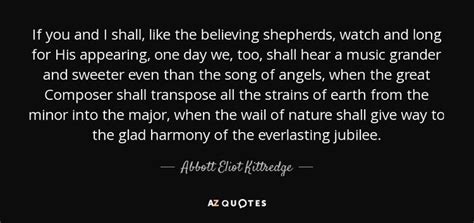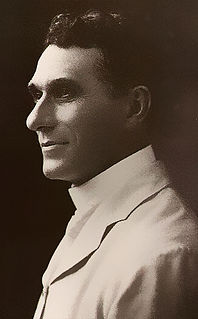A Quote by George Eliot
There are natures in which, if they love us, we are conscious of having a sort of baptism and consecration.
Related Quotes
The Holy Ghost converts [us] from carnality to spirituality. It cleanses, heals, and purifies the soul. . . . . Faith in the Lord Jesus Christ, repentance, and water baptism are all preliminary and prerequisite to it, but [the baptism of fire] is the consummation. To receive [this baptism of fire] is to have one's garments washed in the atoning blood of Jesus Christ.
I know that with consecration on the part of believers, separation from the world, disentanglement from enslaving sins, and a mighty baptism of the Holy Spirit, the church would become a conquering power in the world, not by its constructed theology, not by its Sabbath services, not by its arguments to convince the intellect, but by its simple story of Jesus' love, by the Cross, the Cross--God's hammer, God's fire.
Peter, in showing that the Church is one and that only those who are in the Church can be saved, said: "In the Ark of Noah certain persons, numbering only eight, were saved by water, which Baptism effects in like manner for you" (1 Peter 3:20). He proves and demonstrates that the solitary Ark of Noah was the figure of the One Church. If, at the time of this Baptism of the world anyone could have been saved without having been in the Ark of Noah, then he who is outside the Church could now be brought to life by Baptism.
Our justification from sins takes place at the point of saving faith, not at the point of water baptism, which usually occurs later. But if a person is already justified and has sins forgiven eternally at the point of saving faith, then baptism is not necessary for forgiveness of sins nor for the bestowal of new spiritual life. Baptism, then, is not necessary for salvation. But it is necessary if we are to be obedient to Christ, for he commanded baptism for all who believe in him.
We have no proper understanding of the relationship between conscious thought and conscious sensation. The various forms of thought and sensation are underpinned by very different neural mechanisms; so how can the neural correlate of their conscious natures be the same? I don't think we are yet in a position to make such speculations. To make progress, we have to have a good conception of the phenomenology of consciousness, among other things.
It is difficult for some people to accept that love is a choice. This seems to run counter to the generally accepted theory of romantic love which expounds that love is inborn and as such requires no more than to accept it. This theory believes that love is a magical force which frees us from all suffering and solves every problem, that it is an end unto itself. To a limited extent, there may be some truths to each of these beliefs, but having the capacity to love is not the same as having the ability to love.
Nobody that I know really likes the feeling of having no power and not being able to influence people. But most of us aren't too conscious of what we are trying to do and get that control and that power so people end up sort of playing all kinds of unconscious manipulative games or they're sort of half aware, they have an idea of a strategy or goal they want to use and they think about it. But then in the heat of the moment, it kind of all flies out the window.
Which are the people who have influenced us most? Not the ones who thought they did, but those who had not the remotest notion that they were influencing us. In the Christian life, the implicit is never conscious, if it is conscious it ceases to have this unaffected loveliness which is the characteristic of the touch of Jesus. We always know when Jesus is at work because He produces in the commonplace something that is inspiring.
Every soul that is born into flesh is soiled by the filth of wickedness and sin. . . . In the Church, baptism is given for the remission of sins, and, according to the usage of the Church, baptism is given even to infants. If there were nothing in infants which required the remission of sins and nothing in them pertinent to forgiveness, the grace of baptism would seem superfluous
Because of this basin of repentance and knowledge of God, which has been ordained for the transgression of God's people, as Isaiah cries, we have believed, and we testify that the very baptism which he announced is alone able to purify those who have repented. It is the water of life. But the cisterns which you have dug for yourselves are broken and of no benefit to you. For what is the use of a baptism which cleanses the flesh and body alone? Baptize the soul from wrath and from covetousness, from envy, and from hatred, and, lo, the body is pure.






































